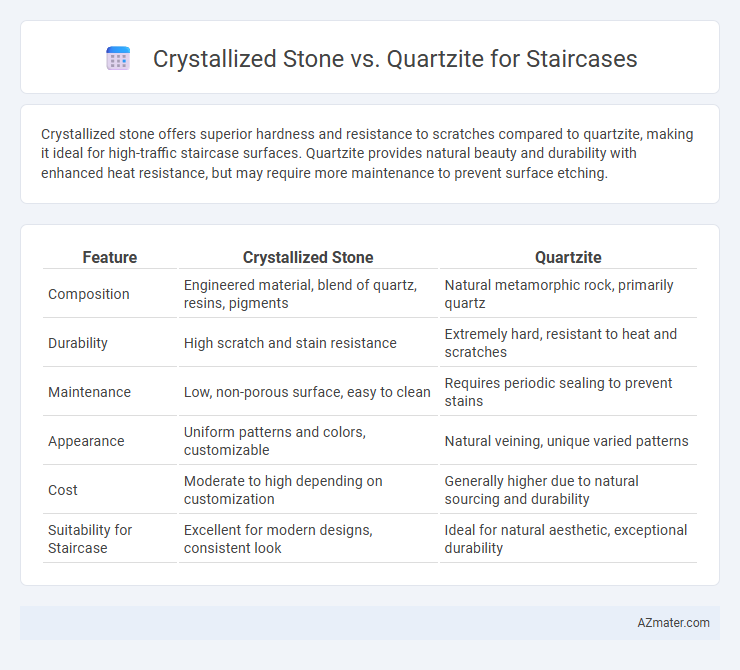Crystallized stone offers superior hardness and resistance to scratches compared to quartzite, making it ideal for high-traffic staircase surfaces. Quartzite provides natural beauty and durability with enhanced heat resistance, but may require more maintenance to prevent surface etching.
Table of Comparison
| Feature | Crystallized Stone | Quartzite |
|---|---|---|
| Composition | Engineered material, blend of quartz, resins, pigments | Natural metamorphic rock, primarily quartz |
| Durability | High scratch and stain resistance | Extremely hard, resistant to heat and scratches |
| Maintenance | Low, non-porous surface, easy to clean | Requires periodic sealing to prevent stains |
| Appearance | Uniform patterns and colors, customizable | Natural veining, unique varied patterns |
| Cost | Moderate to high depending on customization | Generally higher due to natural sourcing and durability |
| Suitability for Staircase | Excellent for modern designs, consistent look | Ideal for natural aesthetic, exceptional durability |
Introduction to Crystallized Stone and Quartzite
Crystallized stone, engineered through a high-temperature fusion of natural minerals, offers exceptional durability and a non-porous surface ideal for staircase applications resisting stains and scratches. Quartzite, a natural metamorphic rock formed from sandstone, exhibits high hardness and heat resistance, making it a popular choice for stair treads requiring long-lasting structural strength. Both materials provide aesthetic versatility with a wide range of colors and patterns, yet quartzite's natural veining contrasts with crystallized stone's consistent, engineered finish.
Composition and Formation
Crystallized stone, often manufactured from natural minerals fused under high temperature, offers a uniform composition predominantly consisting of engineered quartz and resin binders, enhancing durability and stain resistance for staircases. Quartzite, a naturally occurring metamorphic rock, forms from sandstone subjected to intense heat and pressure, resulting in a dense, crystalline structure composed mainly of quartz grains cemented tightly together. The engineered nature of crystallized stone allows for consistent color and pattern control, whereas quartzite's formation produces unique, naturally varied patterns with exceptional hardness ideal for high-traffic staircase applications.
Appearance and Aesthetics
Crystallized stone offers a sleek, polished finish with a glossy surface that enhances light reflection, creating a modern and luxurious look for staircases. Quartzite boasts a natural, textured appearance with unique veining and color variations, providing an elegant and timeless aesthetic ideal for both contemporary and traditional designs. Both materials ensure durability, but the choice primarily depends on whether a high-gloss shine or a more organic, natural surface is desired for staircase design.
Durability and Strength
Quartzite offers superior durability and strength compared to crystallized stone, making it an excellent choice for staircases subjected to heavy foot traffic and weight. Its natural composition of fused quartz grains provides high resistance to scratches, chipping, and heat, ensuring long-lasting performance. Crystallized stone, while attractive and dense, may be more prone to surface wear and requires careful maintenance to maintain its appearance over time.
Slip Resistance and Safety
Crystallized stone offers superior slip resistance compared to quartzite due to its denser surface and textured finish, making it a safer choice for staircases where traction is critical. Quartzite, while highly durable and visually appealing, tends to be smoother and may require additional treatment or anti-slip coatings to enhance safety on stairs. Selecting crystallized stone improves fall prevention and overall staircase safety in both residential and commercial settings.
Maintenance and Cleaning
Crystallized stone offers enhanced stain resistance and requires minimal maintenance, making it ideal for high-traffic staircase areas. Quartzite demands more frequent sealing and gentle cleaning with pH-neutral products to preserve its natural durability and prevent etching. Both materials benefit from regular dusting and prompt spill cleanup to maintain their aesthetic and structural integrity.
Cost Comparison
Crystallized stone generally costs less than quartzite for staircase applications, with prices ranging from $50 to $150 per square foot, compared to quartzite's $70 to $200 per square foot. Quartzite is a natural metamorphic rock known for its durability and resistance to scratching, justifying its higher price point. Crystallized stone, a man-made composite, offers a more budget-friendly alternative with similar aesthetic appeal but may require more maintenance over time.
Installation Process
Crystallized stone stairs require precise cutting and polishing due to their hardness and crystalline structure, often demanding professional tools and expertise to achieve a seamless finish. Quartzite installation involves careful handling to prevent chipping and typically uses mortar or epoxy adhesives for a robust bond, ensuring durability in high-traffic areas. Both materials benefit from expert installation to maximize longevity and aesthetic appeal, but quartzite's slight flexibility can make it marginally easier to work with during fitting and adjustments.
Environmental Impact
Crystallized stone, often made from recycled glass and natural quartz, has a lower environmental footprint due to its use of repurposed materials and energy-efficient manufacturing processes. Quartzite, a natural metamorphic rock, requires extensive quarrying and processing, which contributes to higher carbon emissions and habitat disruption. Choosing crystallized stone for staircases supports sustainable practices by reducing resource extraction and promoting material reuse.
Which Is Best for Staircases?
Quartzite offers superior durability and scratch resistance compared to crystallized stone, making it ideal for high-traffic staircase applications. Its natural hardness and resistance to abrasion ensure long-lasting performance, whereas crystallized stone, often engineered with resin binders, may be more prone to chipping and wear over time. For staircases requiring both strength and aesthetic appeal, quartzite is the best choice due to its natural structural integrity and low maintenance requirements.

Infographic: Crystallized stone vs Quartzite for Staircase
 azmater.com
azmater.com